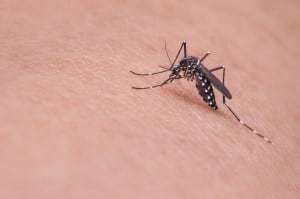In recent weeks, the CDC has urged pregnant women to avoid travel to any area where Zika virus transmission is ongoing. Fetuses and infants of women infected with Zika virus during pregnancy should be evaluated for possible congenital infection and neurologic abnormalities.
What is the Zika Virus?
The Zika virus gets its name from its origins, the Zika forest in Uganda. It is a mosquito-transmitted infection related to dengue, yellow fever and West Nile virus. While it is common in Africa and Asia, it recently spread to the Western Hemisphere.
 For most, the virus has no apparent symptoms or long-term effects. Only one in five people infected with the Zika virus develop symptoms, which can include:
For most, the virus has no apparent symptoms or long-term effects. Only one in five people infected with the Zika virus develop symptoms, which can include:
- Fever
- Rash
- Joint pain
- Red eyes.
Those infected usually do not have to be hospitalized.
The concern comes for pregnant women who develop a temporary form of paralysis after exposure to the Zika virus. This temporary paralysis can result in babies being born with abnormally small heads, a neurological condition known as microcephaly.
I Am Pregnant. How Will Zika Virus Affect Me or My Unborn Baby?
CDC has issued a travel notice (Level 2-Practice Enhanced Precautions) for people traveling to regions and certain countries where Zika virus transmission is ongoing.
This notice follows reports in Brazil of microcephaly and other poor pregnancy outcomes in babies of mothers who were infected with Zika virus while pregnant. However, additional studies are needed to further characterize this relationship. More studies are planned to learn more about the risks of Zika virus infection during pregnancy.
Until more is known, CDC recommends special precautions for pregnant women and women trying to become pregnant:
- Pregnant women in any trimester should consider postponing travel to the areas where Zika virus transmission is ongoing.
- Pregnant women who do travel to one of these areas should talk to their doctor or other healthcare provider first and strictly follow steps to avoid mosquito bites during the trip.
Women trying to become pregnant should consult with their healthcare provider before traveling to these areas and strictly follow steps to prevent mosquito bites during the trip.
Because specific areas where Zika virus transmission is ongoing are difficult to determine and likely to change over time, CDC will update this travel notice as information becomes available. Check CDC’s Zika Travel Information website frequently for the most up-to-date recommendations.
Additional Resources
- Short Answers to Hard Questions About Zika Virus
- C.D.C. Issues Zika Advisory for Pregnant Women and Sex Partners
Update 5/22/17: Click here to see the CDC’s travel recommendations for Zika in that country.






